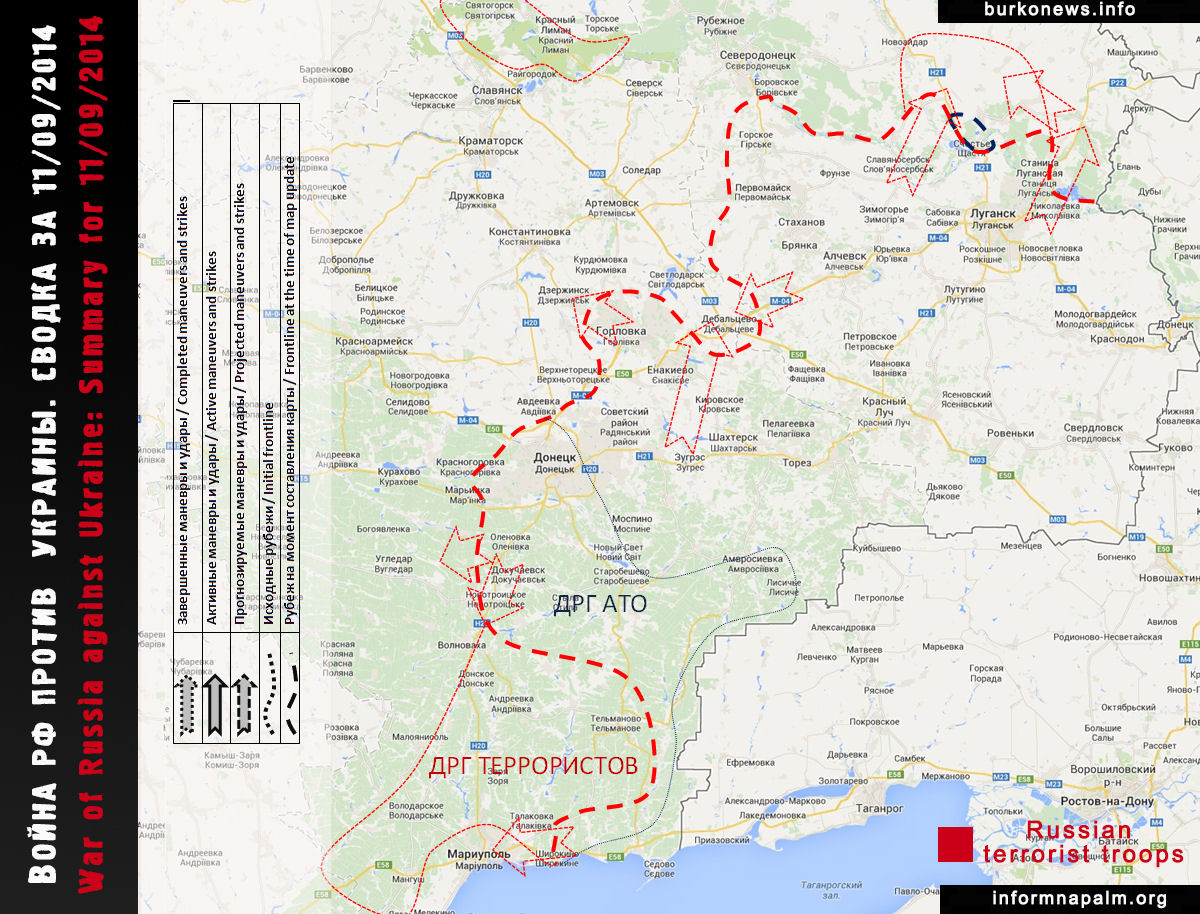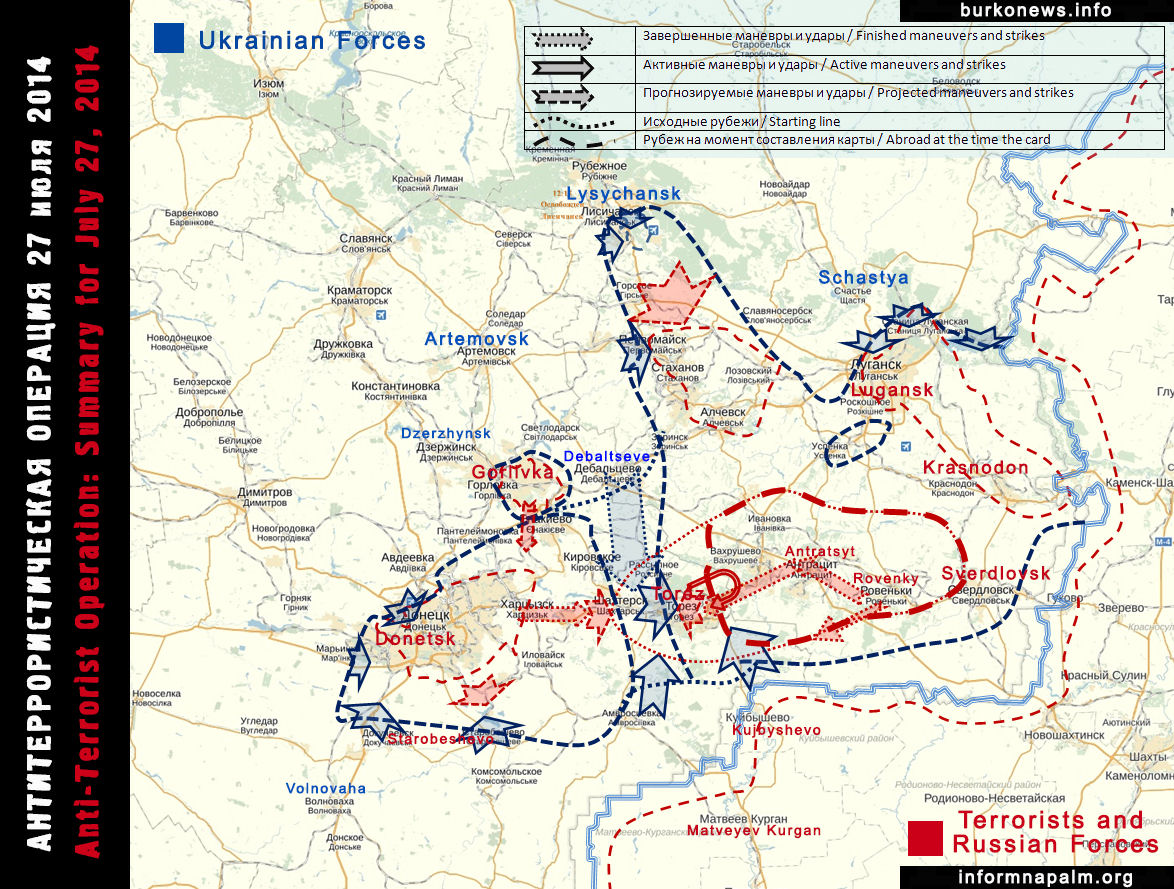By Roman Burko
The Kremlin style continues – one step forward, two steps back in observance of the requirements on the Minsk agreement. The Russian side is strenuously trying to disrupt the peace agreements while continuing the build-up and regrouping of its forces.
The City of Donetsk
We need to pay special attention to Donetsk. Here MLRS artillery systems and fighters have actually not ceased attacks. They generally fire towards the airport and Krasnogorovka. Most likely the enemy is desperate to take the airport. There has been shelling from heavy artillery systems, estimated to have a caliber of 200 mm(!). We have not yet positively identify the artillery system, but one of the experts has made a bold assumption that they are coastal defense artillery systems, which could be put on the chassis of a heavy vehicle.
In addition, the Russian-terrorist began to form defense lines on the south-western outskirts of Donetsk (Alexandrovka). Most likely, the Russian-terrorist will not attack in the direction of Marinka and Krasnogorovka because they have had problems in the southern direction.
The North Donetsk Zone
The enemy continues to build up its strength for an offensive in the direction of Debalseve. The number of Russian-terrorist forces in Alchevsk appears to have grown considerably. A number of armoured vehicles have been transferred from Slovyanoserbsk to Debaltseve, and more armoured vehicles have been noticed in Zuevka.
Russian-terrorists continue the shelling of areas next to Dzerzhynsk, especially the suburbs of Kirove and Artemove. In addition there is very intensive shelling towards Mayorsk. In Horlivka the accumulation of enemy forces has been noticed, most probably for a strike on Debaltseve. However it is always possible that this could be a diversion, designed to persuade the Ukrainian military to redeploy their forces to Debaltseve, while they actually plan to attack Dzerzhynsk and push towards Kostyantynivka.
Southern Donetsk Zone
The Russian-terrorist forces have probably begun to doubt the correctness of decisions regarding the creation of encirclement traps in Amvrosiivka, Yelenovka, and Ilovays’k. This is because there is now no set front line. There are reconnaissance groups of both Russian-terrorists and Ukrainian forces which move freely between towns in this area.
But with Mariupol things are more complicated. Terrorists, together with units of the Russian Armed Forces are preparing an attack from the east side of the city. Now it is very difficult to get information from Novoazovsk residents, where the enemy has introduced strict control over the movement of people. This testifies to the efforts of the Russian-terrorist forces to conceal the movement of vehicles and attack groups in the specified area.
The Luhansk Zone
In Luhansk we can only report on the strengthening of the front line by “LNR” forces. Also according to local residents in Luhansk passports of “LNR” are now in evidence, and the terrorists are forcing people to take `citizenship’ of the `republic’.
The movement of the terrorist forces to Slovyanoserbsk (Zymohirya), on the Donets River, has been noted. The Russian-terrorists have the potential to close the ring around the Shchastya if they initiate actions in this direction. This is especially true considering the arrival of new military equipment from the Russian Federation in Luhansk.
Events on the international arena
Today, the former leader of the terrorists Igor Girkin appeared in Moscow at the press briefing. He stated that the agreement reached in Minsk leads to the “shameful and the complete defeat of New Russia.” If we’ll bear in mind the previous reproaches of Girkin and criticism towards Russian leadership for being passive, Girkins words can be interpreted as an attempt to influence public opinion.
Also today Putin ordered snap combat readiness drills in Russia’s Eastern Military District, starting Thursday. This was announced by Russia’s Defense Minister Sergei Shoigu.
Barack Obama announced that new sanctions against Russia are to be implemented on September 12th. New restrictive measures will affect the financial, energy and defense sectors of the Russian economy. Also, On September 12th the latest EU sanctions will come into operation.
We would also like to remember that September 11 is “Patriots Day” in the United States, observed as a day of remembrance. It is established in the memory of the 2,977 people, who died in the terrorist attacks on September 11, 2001. In Russia, however, they celebrate an orthodox holiday – the beheading of John the Baptist. Since the beginning of the conflict and the undeclared war between Ukraine and Russia, it seems Orthodox holidays are becoming anchor points for bloody escalations by Russia.
Conclusion
Responses to the introduction of tougher sanctions, countless attempts to disrupt the peace plan, the marshaling of Russian forces, and the ongoing rumors about the sharp escalation of the conflict in Ukraine provoked by the Russian Federation, all impose on September 12 new concerns and expectations… Be ready for everything.
WE WILL WIN TOGETHER
[hr] Source: burkonews.info, Written by Roman BurkoTranslated by Victoria Field and Aleko Burduli. Edited by Larry Field








